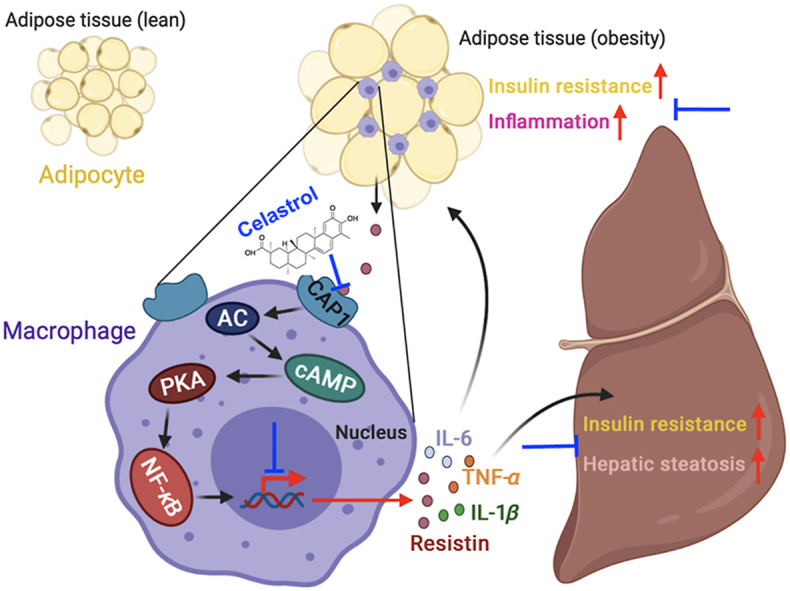- Record: found
- Abstract: found
- Article: found
Celastrol targets adenylyl cyclase-associated protein 1 to reduce macrophages-mediated inflammation and ameliorates high fat diet-induced metabolic syndrome in mice

Read this article at
Abstract
Metabolic syndrome is a clustering of metabolic disorder with unclear molecular mechanism. Increasing studies have found that the pathogenesis and progression of metabolic syndrome are closely related to inflammation. Here, we report celastrol, a traditional Chinese medicine, can improve high fat diet-induced metabolic syndrome through suppressing resistin-induced inflammation. Mechanistically, celastrol binds to adenylyl cyclase associated protein 1 (CAP1) and inhibits the interaction between CAP1 and resistin, which restrains the cyclic adenylate monophosphate (cAMP)–protein kinase A (PKA)–nuclear factor kappa-B (NF- κB) signaling pathway and ameliorates high fat diet-induced murine metabolic syndrome. Knockdown of CAP1 in macrophages abrogated the resistin-mediated inflammatory activity. In contrast, overexpression of CAP1 in macrophages aggravated inflammation. Taken together, our study identifies celastrol, which directly targets CAP1 in macrophages, might be a promising drug candidate for the treatment of inflammatory metabolic diseases, such as metabolic syndrome.
Graphical abstract
In obesity, adipose tissue generates resistin, which binds to CAP1 on macrophages and activates the cAMP–PKA–NF- κB signaling pathway and promotes proinflammatory cytokines expression. These factors further aggravate inflammation, insulin resistance, and hepatic steatosis. Celastrol ameliorates metabolic syndrome via binding to CAP1 and inhibiting its interaction with resistin.
Related collections
Most cited references44
- Record: found
- Abstract: found
- Article: found
The Global Epidemic of the Metabolic Syndrome
- Record: found
- Abstract: found
- Article: not found
Supplementation with Akkermansia muciniphila in overweight and obese human volunteers: a proof-of-concept exploratory study
- Record: found
- Abstract: found
- Article: not found
